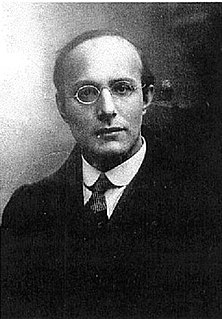A Quote by Ludwig von Mises
If one rejects laissez faire on account of mans fallibility and moral weakness, one must for the same reason also reject every kind of government action.
Quote Topics
Related Quotes
There was nothing natural about laissez-faire; free markets could never have come into being merely by allowing things to take their course. Just as cotton manufactures were created by the help of protective tariffs, export bounties, and indirect wage subsidies, laissez-faire was enforced by the state.
To check centralization and usurping of power ... we require a new laissez-faire. The old laissez-faire was founded upon a misapprehension of human nature, an exultation of individuality (in private character often a virtue) to the condition of a political dogma, which destroyed the spirit of community and reduced men to so many equipollent atoms of humanity, without sense of brotherhood or purpose.
Laissez-faire capitalism, or anarchocapitalism, is simply the economic form of the libertarian ethic. Laissez-faire capitalism encompasses the notion that men should exchange goods and services, without regulation, solely on the basis of value for value. It recognizes charity and communal enterprises as voluntary versions of this same ethic. Such a system would be straight barter, except for the widely felt need for a division of labor in which men, voluntarily, accept value tokens such as cash and credit. Economically, this system is anarchy, and proudly so.
Government control of the economy, no matter in whose behalf, has been the source of all the evils in our industrial society -- and the solution is laissez-faire capitalism, i.e., the abolition of any and all forms of intervention in production and trade, the separation of State and Economics, in the same way and for the same reasons as the separation of Church and State.
And therefore, as when there is a controversy in an account, the parties must by their own accord, set up for right Reason, the Reason of some Arbitrator, or Judge, to whose sentence, they will both stand, or their controversy must either come to blows, or be undecided, for want of a right Reason constituted by Nature; so is it also in all debates of what kind soever.
Wherever moral ambition exists, there right exists. And moral ambition itself must be presumed present in subconsciousness, even when the conscious self seems to reject it, so long as society has resources for bringing it into action; in much the same way that the life-saver presumes life to exist in the drowned man until he has exhausted his resources for recovering respiration.
Capitalism is the only system that can make freedom, individuality, and the pursuit of values possible in practice. When I say 'capitalism,' I mean a pure, uncontrolled, unregulated laissez-faire capitalism - with a separation of economics, in the same way and for the same reasons as a separation of state and church.
[Action's] a Western thing. We think of the hero going into battle, rebelling against a government or an oppressor, but [in KUNDUN] action is nonaction or what appears to be nonaction. That's a hard concept for Western audiences. . . . We wanted to show a kind of moral action, a spiritual action, an emotional action. Some people will pick up on it; some won't.




































